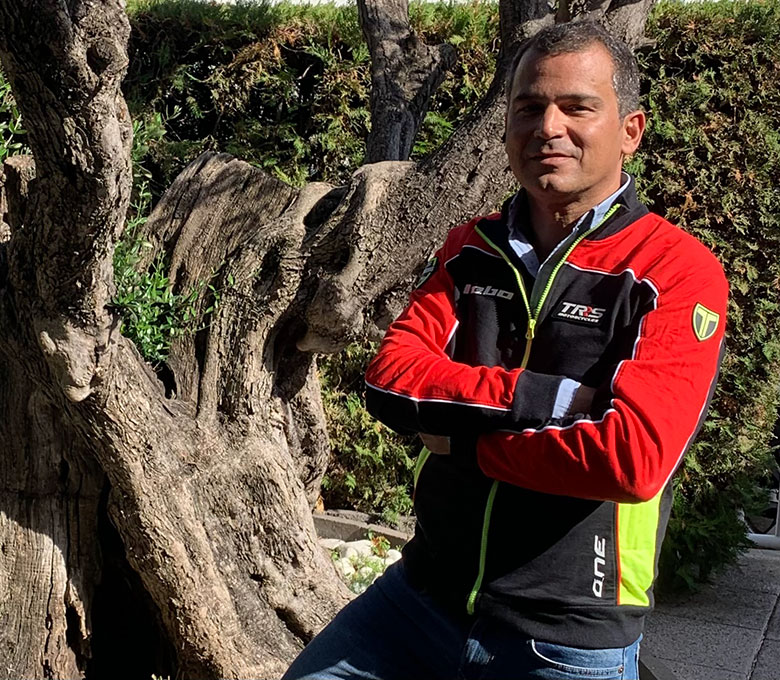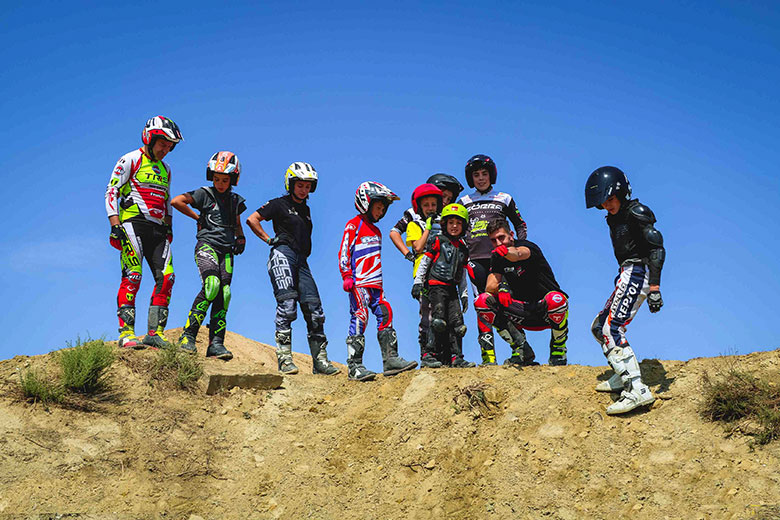TRRS SCHOOL PROJECT – INTERVIEW

TRS motorcycles presented at the beginning of this year 2023 its new project, the TRRS SCHOOL, for the promotion of trial through its teaching. From MEDIA NAME we wanted to ask the promoters about their reception after the first four events.
We’ve talked with Jordi Tarrés and Marc Arañó, founding partners of TRRS, as well as with Marc Farrerons, the brand’s marketing manager and leader of the School 23 project.
How was the idea of the TRRS School project born?
M. A: At the beginning (later we have been shaping it), seeing that any initiative that had to do with teaching trials to the youngest was a success, aroused our interest and made us rethink where it was necessary to invest time, effort and resources. We must go to the base, supporting on the one hand professionals who are already doing it and with incredible results, also abroad, as well as doing it ourselves directly.
Is it more necessary to invest in a School than in a World Championship?
M.A Good question and appropriate nowadays…. I’ve so much clear that we have to invest in the TRRS School project and in any similar initiative aimed at the grassroots and our customers, which disseminates and promotes the teaching and practice of this sport, above any other, you have referred to the World Championship, it has been a long time since I saw our customers there, but we have great riders representing the brand that we support to the maximum.
What is your reading of the different Schools you have done this year?
M.A: Very positive, it was difficult to fit in dates but for the moment we have been in Granada, Madrid, Alicante and in the Canary Islands, we will finish with Navarra/ Basque Country and Barcelona in October and December respectively. The feedback by now has been really positive, in all the events we have involved and counted on the official distributors in the area and that has been the key of success when it comes to convening.
 What does a TRRS School consist of? What structure do you have?
What does a TRRS School consist of? What structure do you have?
M.A: We travel to each School with our own structure, TRRS van, tents and two instructors, we have the best, Sam Obradó, former world champion and Marc Farrerons, who in addition to being the head of marketing for the brand, is the person who promoted trial through teaching, leading the Cen Peus Moto Club School project, with a lot of experience, especially with the youngest riders. The people who come, find the TRRS structure deployed and at their disposal, with three hours of class, normally, Marc Farrerons stays with the youngest and Sam with the adults. We also take test bikes, and of course, we conclude the day with a joint meal.
You mentioned Marc Farrerons, let’s ask him what he comes home with after each school?
M.F: The feeling after each of the TRRS school events has been incredible. Specially for those of us who are dedicated to and passionate about trials. The TRRS School project was born precisely from this, to transfer the passion and knowledge that we have from TRRS in different parts of Spain.
I think that, in recent years, and thanks in large part to the work of Trial Organizers & Areas ,Trial Schools, among others… trial has taken a very positive path towards its growth as a sport. When we come back from the different TRRS SCHOOLs we are convinced that trial as an amateur sport is in good health.
We find enthusiasm for trials, a desire to learn and wonderful people wherever we go. It is very gratifying to see how grateful the fans are that a brand like TRRS organises an event exclusively for them.
We have seen some photos showing bikes that are not TRRS; is the TRRS School open to everyone?
M.F: As I said before, I think that the project goes beyond thinking about sales or promotion of our bikes, and it is really focused on promoting Trials from the grassroots. If we take this into account, it wouldn’t make any sense to leave out people who have a bike that is not from our brand.
Will we see a TRRS School in 2024, 2025 and beyond?
M.F: Without any doubt, we would love to. As I said, the reception so far has been very positive and our intention is to continue working so that the project keeps growing.
I think we have a great team for this, and we are also aware that this work also requires a certain amount of time for us all to see its results.
…and outside Spain? Have you considered exporting the project?
M.F: Indeed, it is part of our plans. During this first year, we have only carried out the courses in Spain with the intention of gathering as much information and experience as possible to pass on to our importers for the future.
In fact, and as a mere curiosity, at some of this year’s events, we have seen students who have travelled from other countries attracted by the initiative.
 …and now, of course, we ask Jordi Tarrés …. Jordi, will the fans be able to see you at a TRRS School?
…and now, of course, we ask Jordi Tarrés …. Jordi, will the fans be able to see you at a TRRS School?
J.T: The truth is that I would have liked to attend one of them, especially seeing the reception that the project has had among trial fans. This year we have a very tight calendar between national and international competitions and other events, so there are few free weekends. Despite this, I would like to attend the last event that we are going to hold in Barcelona.
Jordi, is TRRS School part of a strategy of the brand to target new horizons and channels for the promotion of trial beyond the usual ones?
J.T: At TRRS we are aware that Trial needs a change in its promotion, and as far as we are concerned, we are working from different areas to give a new focus so that our client and in general any Trial fan can benefit from it.
What kind of amateurs are the TRRS School for (level, age, ….)?
J.T: It is an event open to all types of riders, regardless of their age or level. There are boys and girls, men and women, and even young riders who have already made podiums in this year’s Spanish Trial Championship.
Isn’t it difficult to combine riders of different ages and levels in the same event?
J.T: Normally we have different groups, and we divide them according to the age and level of each student. This makes the course more dynamic, and, in many cases, there is also a bit of healthy rivalry between the participants.
Do you notice a better reception in places where there are more possibilities and freedom to practice this sport?
J.T: Of course, being able to have a space with freedom to practice Trial is something basic to forge a base and a hobby. In this aspect, I think that we are working year after year so that the possibilities grow and there are more areas where people can practice Trials.
For our part, we have always been committed to supporting Areas, Clubs, among others. It is essential to work on this.
 Trial has been evolving towards very demanding techniques and the obstacles that we see in competitions are becoming higher and higher and more “indoor”. Don’t you think that this “evolution” is damaging the arrival of new fans in the long run?
Trial has been evolving towards very demanding techniques and the obstacles that we see in competitions are becoming higher and higher and more “indoor”. Don’t you think that this “evolution” is damaging the arrival of new fans in the long run?
M.A: From my point of view, without a doubt. That’s why we have asked the FIM for measures to move in the right direction, but they don’t listen to us.
Of the young fans who come to your courses, what is the percentage of those who come to this sport because their father or another family member or friend does it?
M.F: The situation has diversified a lot in recent years. Thanks to the appearance of electric children’s bikes such as the ON-E KIDS or even the more recent ON-E Balance, many children are showing an interest in trial bikes without their parents having been riders in the past.
If we add to this the rise of the Trial Schools and the work they do to introduce young and old to Trial, we find new riders who do not have a trial background.
Many people tell us that they have the feeling that trial is a sport in which you either start very young or you’re too late, is that true?
M.F
In my opinion, I don’t agree 100%. Obviously, everything depends on the aspirations you have when you start. If you want to try to dedicate yourself to it professionally, you should start when you are quite young.
If we are talking about amateur level, we often find groups of people who start or take up Trial when they are over 40 years old and they enjoy it very much.
In the end, being a sport where the risk of injury is very low, we find people who practice it from a very young age until they are over 60.
Should we differentiate between learning with the aim of competing and learning with the simple aim of enjoying trial?
J.T: I believe that both are perfectly compatible. Beyond competitions such as the Spanish Championship or even the World Trial Championship, there are big events on the calendar where we find professional and amateur riders sharing the same route and even areas, despite having different objectives.
Being a professional trial rider requires an incredible amount of work and sacrifice. However, enjoying the day to day and the bike is also essential for the riders.
Do you plan to expand the courses in the coming years with more places and more instructors?
J.T: We would love to! Although it is true that we want to go step by step, our intention is to be able to reach a greater number of people, either with more places and teachers, and also by expanding the activities that result from the TRRS SCHOOL project.


